The Need to Know: A witty, steamy, heartwarming read. Don’t mind me…I’m just reading all the other books in the mega-talented Meredith Duran’s catalog asap.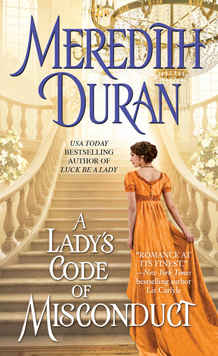 I live for banter. Okay. I don’t live for it. But when it’s done well—I’m talking the Katharine Hepburn and anybody else variety--it’s enough to make an embarrassing smile come to my face and butterflies come to life in my stomach. I found the banter that I’ve been looking for in Meredith Duran’s lovely, satisfying, and witty latest release, A Lady's Code of Misconduct. This stellar novel was my introduction to Duran, and I’m pretty happy about it. First, the setting. The place: England. The time: 1860. Crispin Burke is an unlikable but also very attractive man who has no scruples about using bribery and manipulation to get what he wants in the political sphere. After he angers the wrong person, he’s attacked and left for dead; when he awakens, he’s informed that he has a wife. Believing that Crispin would die, Jane Mason conveniently claimed (read: lied) that she and Crispin were married so that she could leave her aunt and uncle’s oppressive home and gain control over her inheritance. But Crispin does not die, and when he awakens, he does not remember the last several years of his life. He’s also much different from how Jane remembers him. He’s warm, tender, and conscientious, but he’s also still hot. Sounds pretty amazing, right? Jane and Crispin both find themselves fighting their sexual and emotional attractions to one another, as the past looms large. Will Crispin regain his memory? And if he does, how will he and Jane reconcile the earlier Crispin—the unscrupulous one whom Jane was acquainted with—with the man whom she has romantic feelings for? And, what will Jane do about the lie she told, you know, the little one about being married to Crispin when she actually wasn't? There’s so much to adore in this book. First of all, I really like Jane, who is an unapologetic philanthropist and feminist. She has a strong interest in politics and living in her uncle's home hasn't squashed that out of her. Her belief that she has something to contribute to conversations, to politics, and to the lives of the less fortunate, makes her nuanced and admirable. And, Crispin’s insistence that those qualities of hers are important to him, too, are lovely—precisely because every partner would love to hear that their passions, if not shared, are at least appreciated. As I mentioned above, the witty repartee is so good, without seeming mannered. Jane and Crispin’s observations about the society around them are similarly trenchant and often amusing. There are some really incredible observations made about the perceived role of women which made me LOL and also cringe the tiniest little bit (because, to state the obvious, gender relations in nineteenth-century England were not amazing, and let's not even get started about what life would have been like then for non-privileged white women or women of color). Finally, I was quite enamored with the characters' evolutions throughout the novel. Duran paints the development of Crispin's personality, and his growing awareness of how he's affected others and they've affected him, with sensitivity. Though Crispin arguably achieves the greatest transformation, I also appreciated the growth that Jane attains throughout the book. See? So much to adore here. As far as I’m concerned, devouring Duran’s A Lady's Code of Misconduct over the last two days was an excellent use of my time, and I’m already looking forward to reading her other books. Thanks to NetGalley for providing me with a free copy of this book. All opinions provided in this review are my own.
0 Comments
I will make fun of myself a lot in this book, but understand I feel good, healthy, strong, and fuckable. I'm not the hottest chick in the room. I would be like the third-hottest bartender at a Dave & Buster's in Cincinnati." 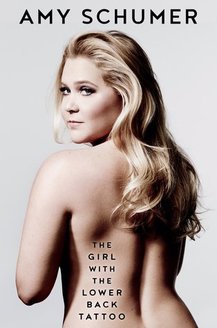 The Girl with the Lower Back Tattoo by Amy Schumer I chose to read most of Amy Schumer’s The Girl with the Lower Back Tattoo while travelling to and from Cape Cod on a wonderful visit with my best friends. Since I was travelling alone I can’t be positive of this, but I have the feeling that I had a smile on my face, occasionally interrupted by a more pensive expression, nearly the entire time that I read this exceptional book. I’m sure that these facial expressions, (in addition to my bulky black laptop bag, which Mary Catherine assured me was not cute), went a long way toward convincing those sitting near me that I was a well-meaning but awkward stranger, which is, in fact, what I was. A series of essays, lists, journal entries, and meditations on Amy Schumer’s life, The Girl with the Lower Back Tattoo is very frequently LOL-funny, often inspirational and insightful, and by turns sad or sentimental, without becoming cloying. Schumer covers a gamut of topics, ranging from her family life (her relationships with her parents and siblings, her dad’s battle with MS), to her sexual and romantic experiences, to her drive to be a stand-up comic, to what she would want people to say and do at her funeral. These are some of the things I love about her book: Schumer is unapologetic about what she believes in, like common-sense gun reform. Second, she’s absolutely clear that while she is able to laugh at herself and the things that she has done, this self-deprecating humor is not an indication of low self-esteem. And third, she shows compassion toward the younger girl she was, the woman she is, and the woman she will be. A recurring theme in her book is that it's possible to learn from mistakes and appreciate that that growth and evolution help make us who we are; beautiful, complex humans. This was a huge lesson for me, someone who still internally cringes when I remember awkward/insensitive/arrogant things that I’ve said and done. Schumer even includes old journal entries (with 2016 annotations) in her book; can you imagine putting yourself out there like that? While I am aware that any kind of creative project—autobiographical or otherwise—allows the author to control in some way how they are perceived (by what they tell or don’t tell, how they tell it, what they focus on and omit, etc.), this is how I, as the reader, walked away feeling: that I knew Amy Schumer better and that I could relate to her. This was a hilarious, moving read. Perfect If You: Love Amy Schumer, comedy, memoir, coming of age stories, dirty humor; want to celebrate being human Not Recommended If You: Would rather not read intimate details about Schumer’s life (but if you have watched her show or stand-up, you probably won’t be surprised by some of the things that she includes) Check Out: Last week’s recommendation on Jessi Klein’s You’ll Grow Out of This; Amy Schumer’s show Inside Amy Schumer; any of the essays written by Klein, Tina Fey, Amy Poehler, and Mindy Kaling. Images from Goodreads. Click on photos for links.
If You Need a Laugh: Try You’ll Grow Out of It by Jessi Klein, writer on Inside Amy Schumer. This book is in the same vein as Tina Fey’s Bossypants, Amy Poehler’s Yes Please, and Mindy Kaling’s Why Not Me? and Is Everyone Hanging Out Without Me? (And Other Concerns). In You’ll Grow Out of It Klein tackles topics like wedding dress shopping, pumping in a room at her first Emmys while everyone else celebrated, and the differences between women ("poodles" versus "wolves"). I particularly loved her essay about how other people decide when women have moved from a “Ms.” to a “Ma’am”—a funny essay with the sting of the truth. This book is hilarious, smart, and totally worth your time. One of my favorite reads of 2016. If You’re in the Mood for Romance: Try Jill Shalvis’s It Had to Be You, a book in her Lucky Harbor series. It Had to Be You is a contemporary romance that has all of the things that I’m looking for when I read romance: incredible chemistry, a convincing conflict, and a satisfying happily ever after. There’s more good news if you like this book: there are fourteen other books and/or novellas within the Lucky Harbor series. Enjoy! If You Want to Re-Visit a Childhood or Teenage Classic: Try To Kill a Mockingbird by Harper Lee. I don’t know about you all, but I re-read this book relatively recently for the first time in many, many years. I think that I was even more impressed with Lee’s towering literary achievement this time around than I was initially. The themes of this book particularly resonate with me now, when I’m taking a harder look at my own actions and biases and also thinking more about how I can stand up for what I believe in (love, acceptance, and unity; diversity should be celebrated; people should be free to say what they want, worship in whatever way they believe, love whomever they want, etc.) but also not write off the people that I love who voted for (or otherwise supported) a man whom I believe stands in direct opposition to my core values. I read an NPR article that states that books can help us "bridge the political divide." To Kill a Mockingbird reminds me of the importance of empathy—which so many people have called for as a means of understanding the “other side’s” political views—but also that there’s a time when anger and conviction are necessary, too. We shouldn’t stop being angry at what Trump has said and continues to say, and what actions he continues to support because so much of it is racist, xenophobic, homophobic, misogynistic, among other things. What will you be reading this weekend? |
About me.Give me that HEA, please.
Join my mailing list.Want to receive a weekly email with links to my latest blog posts? Sign up below!
Archives
April 2024
Categories
All
|
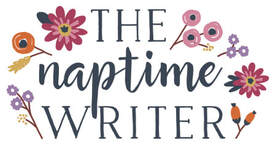
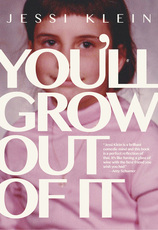
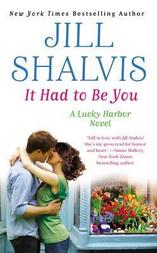
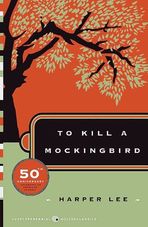
 RSS Feed
RSS Feed
